Ed Department Shakes Up OPMs and Third-Party Servicers: This Is Huge
Published by: WCET | 2/22/2023
Tags: Higher Education, SAN, Third-Party Servicers, WCET
Published by: WCET | 2/22/2023
Tags: Higher Education, SAN, Third-Party Servicers, WCET
The Department of Education has updated the dates previously discussed in this post.
Did you hear that loud noise last Wednesday? For those in the middle of the country, it was the Kansas City Chiefs victory parade. For those in higher education, the U.S. Department of Education created its own rumblings by releasing new guidance with rules about any contracted services and a series of questions about companies helping institutions with online learning. For some time, we have been expecting a change in guidance regarding Online Program Management (OPM) and the revenue-sharing model used by some of those companies. There has been much interest in assuring student consumer protection in this growing industry and in institutional outsourcing.
Earlier this year, the Department signaled it would hold negotiated rulemaking including “Third-Party Servicers”. We thought OPMs and other contracts would be covered in that process. Instead, the Department issued broad guidance on a wide range of “Third-Party Servicers”. It also announced that it was seeking input on nine questions about OPMs, especially around the OPM revenue-sharing model and its “bundled services exemption.”
We did not expect the large-scale change in guidance regarding almost any service for which an institution might contract. In the PhilonEdTech blog post review of the release, Phil Hill opined:
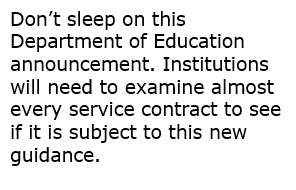
“Basically, if a vendor provides software and services enabling in almost any way an academic program eligible for Title IV financial aid, that vendor may be considered a TPS with all of the increased regulations.”
This could have an impact on contracts for OPMs, tutoring services, retention tracking, student analytics, adaptive learning, learning management systems, contracted instructional design, and (surprisingly) even contracting for financial aid consulting. This regulatory guidance will reach into every corner of an institution. And there were some surprising elements including the exclusion of the use of foreign contractors and the inclusion of services offered to an institution by its own higher education system.
The bundling in the announcement of new guidance for Third-Party Servicers and a series of questions about OPMs resulted in confusion both for us and for several analyses we have read. Some think that the Third-Party Party Servicers wording is focused only on OPMs. Not so. It covers any contracted service. And there are only two comment opportunities and one action with a short deadline. If we were confused by their bundling of the two issues in one announcement and some unclear wording, we feel for institutional personnel not used to interpreting this language.

As a result, we took our time to write this blog post where we tried to interpret at the highest level what is happening and give you some context. This post separates the information about the OPM and Third-Party Servicers impact into two sections. Regarding the term “OPM”, we realize that there are varying models for the provision of online support services that use different names. Some use the “revenue sharing” method of reimbursement while others use a “fee for service” model that does not have payments dependent upon the number of students recruited. For simplicity, we use the term “OPM” as an all-encompassing moniker.
Be sure to note that the Third-Party Servicers language will affect everyone and has immediate effect. Take action now.
The first part of the Department’s announcement last week had to do with the oversight of Online Program Management (OPM) companies. They are specifically concerned about incentives for “revenue sharing” or “enrollment compensation,” such as paying contractors on a sliding scale based on increased enrollments. One can imagine the distasteful image of bounty hunting such actions raise.
In last week’s announcement, the Department gave a brief history of the issues and their concern:
“Since 1992, section 487(a)(20) of the HEA has prohibited institutions of higher education (institutions) from providing any commission, bonus, or other incentive payment to individuals or entities based, directly or indirectly, on success in securing enrollments or financial aid to any persons or entities engaged in any student recruiting or admission activities or in making decisions regarding the award of student financial assistance, subject to certain exceptions…”
The Department cites guidance it issued in 2011 (DCL GEN-11-05) providing its interpretation of regulations relating to the prohibition on incentive compensation. Continuing from the Department’s announcement last week:
“Under that guidance, direct payments to recruiters based on tuition generation are considered prohibited incentive compensation. However, in the case of a third-party entity that is not affiliated with the institution it serves and is not affiliated with any other institution that provides educational services, the guidance specifies that providing a set of services that includes recruitment (known as bundled services) does not violate the prohibition on incentive compensation as long as the entity does not make prohibited compensation payments to its employees, and the institution does not pay the entity separately for student recruitment services.”
Commonly known as the “bundled services exception,” many see it as a loophole that allows companies to prioritize profits they get from recruiting over prioritizing whether the institution is the best fit for the student. The Department cites the larger-than-expected impact that the 2011 interpretation:
“Since issuing that guidance, the number of students who were recruited to institutions by entities operating under this bundled services exception has increased significantly, particularly through online programs operated by third-party entities, including Online Program Managers (OPMs).”
There have been plenty of concerns raised about issues with OPMs and companies performing significant services (especially in recruiting) for colleges and universities. There have been times when students have been harmed. There are projections about what might happen to future enrollees if OPMs continue unchecked.
Here’s a sample of problems, concerns raised, and calls for action:
In brief, there is a worry that OPMs represent a for-profit model operating under the guise of a non-profit or public institution; the proverbial wolf in sheep’s clothing. These concerns were heightened by stories of the OPMs taking large shares of the tuition revenue, aggressive recruiting of students, and institutional lack of control over the program. We have heard stories from members about conflicts with their OPM provider. We work deeply on institutional compliance issues and have seen some examples where actions and advice made us feel uncomfortable.
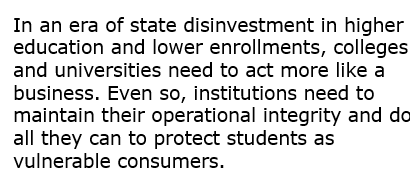
On the other hand, while egregious actions make the headlines, they do not seem to be the norm. Institutions have had great success with OPMs. They have been able to develop programs, reach new markets, and educate students who otherwise would have been left behind. In an era of state disinvestment in higher education and lower enrollments, colleges and universities need to act more like a business. Even so, institutions need to maintain their operational integrity and do all they can to protect students as vulnerable consumers.
The Department of Education announced opportunities for anyone to give input during “listening sessions” or written comment. Details on how to participate are listed at the end of this post in the section: “Part Three: Comments to Make, Action to Take, and How to Do So”. Quick action is needed as the commenting period ends on March 16.
According to the Department, the purpose of the comment period is for:
“…seeking to better understand the impact of the bundled services exception in the context of growing online enrollment and associated Federal student loan debt. The Department is currently reviewing the incentive compensation guidance to determine what, if any, changes to the incentive compensation guidance might be appropriate, particularly regarding the exception for bundled services.”
Below are the nine specific questions they are asking. While the focus is on the “bundled services exception,” it is clear that (as you will see with the Third-Party Services guidance below) their interest goes well beyond revenue sharing models.
We sent out a survey to WCET and SAN members about their experiences with OPMs. We will also provide both memberships with further guidance and impressions about the OPM questions asked by the Department and give you suggestions on options to use in submitting your own response.
It is important to get comments from all sides of this issue. If your institution has or had an OPM, consider commenting. Some of the questions are hard for institutional personnel to give much insight, so they can be skipped.
As mentioned above, a separate but related part of the Department’s February 15 press release is what the Department indicates is “updated third-party servicer guidance”. This guidance can get complicated very quickly, but we are providing an overview and will dive deeper in future messages to members and blog posts.
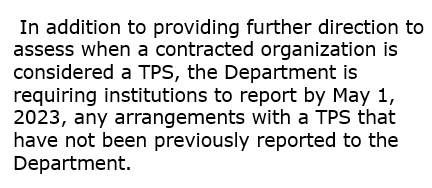
Effective immediately, the Department’s updated guidance is intended to clarify what contracted services are considered a third-party servicer (TPS). The guidance includes an updated list of functions that are within the scope of the Department’s oversight as a TPS. In addition to providing further direction to assess when a contracted organization is considered a TPS, the Department is requiring institutions to report by May 1, 2023, any arrangements with a TPS that have not been previously reported to the Department.
The guidance acknowledges that OPMs are a type of TPS. However, the guidance goes further to describe other agreements that should be considered a TPS. The examples provided are sometimes helpful and often fall short in detailing the extent to which the institution should consider that their contracts fit within the view of the Department as a TPS. Institutions should be aware that the guidance appears to address campus-based functions not just distance education.
This guidance updates and replaces past guidance provided in Dear Colleague Letters GEN 12-08, GEN 15-01, and GEN 16-15 (as amended by the March 8, 2017 electronic announcement), and those documents are considered rescinded.
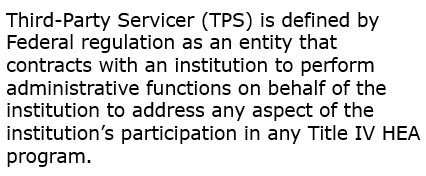
Third-Party Servicer (TPS) is defined by Federal regulation as an entity that contracts with an institution to perform administrative functions on behalf of the institution to address any aspect of the institution’s participation in any Title IV HEA program. The regulation goes on to indicate a long, but noted as non-exhaustive, list of functions that primarily includes processing financial aid applications and payments. The Department, in its new guidance, maintains that most activities by outside entities are subject to Department oversight because the activities are “intrinsically intertwined” with the administration of Title IV. This new guidance provides a list of six functions intended to summarize the long list of functions provided in regulation that would identify the contracted entity as a TPS. Particularly concerning are two of the functions in the guidance that appear to be very broad. These two broad functions below appear to be catch-alls that capture any remaining activities conducted by outside entities as “intrinsically intertwined” with the administration of Title IV and making them a TPS:

These catch all bullets cause us to pause and consider what a colleague shared as “if it breathes on Title IV, it is a TPS”. Based on the guidance language, our colleague’s assessment might be correct! This view could mean in addition to OPMs, Learning Management Systems, state agencies, law firms, and some consultants could be categorized as a TPS. This list could get long!
Lastly, a non-US entity cannot contract with an institution as a TPS. The guidance explains that contractors located outside of the United States or those owned or operated by an individual who is not a U.S. citizen or national or a lawful U.S. permanent resident cannot contract with an institution as a TPS to perform any aspect of the institution’s participation in a Title IV program. We will seek answers about the impact of this criterion.
The Department provides a set of tables with two columns with the elements of a Third-Party Servicer vs. Not a Third-Party Servicer to help an institution assess their agreements with outside entities who perform activities in certain topic areas. These topic areas include:
If after review of these topic area explanations you are still unsure whether your contract with an entity is a TPS, the Department directs that you should contact the School Participation Division at CaseTeams@ed.gov. We urge you to keep that email contact handy! Ask them questions, as this guidance is far-reaching, and you will want to understand how the guidance should be implemented at your institution.
Federal regulation directs the required reporting of a TPS. The guidance reinforces that requirement and highlights key components including:
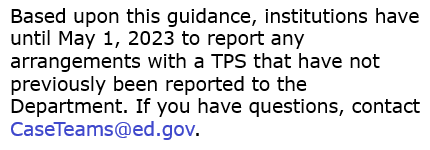
Because this guidance will cause institutions to re-evaluate their contracts to make new TPS determinations, the guidance provides that institutions have until May 1, 2023, to report any arrangements with a TPS that have not been previously reported. Additionally, entities or individuals that meet the definition of a TPS have until May 1, 2023, to submit the Third-Party Servicer Data Form to the Department or update their existing form.
The Department’s press release provides a mechanism to comment on the TPS guidance that is separate from the OPM-related commenting process, but it is very confusing. The opportunity to comment about TPS guidance is through a different Docket identification number than the request for information for OPMs regarding incentive compensation. It is important to keep these two parts of the Department’s press release and the two opportunities to comment separate. We provide the details below.
Department guidance does not typically offer the opportunity to comment. However, the Department is seeking comments regarding the new TPS guidance and indicated in the press release that they will consider those comments and publish any relevant changes based upon that feedback at a later date. The information to submit a public comment about the third-party servicer guidance is offered below. Given the wide-ranging impact of this guidance without any warning or input before releasing it, we think you should consider commenting if you have questions, requests, or suggested changes.
We know that the Department’s press release, the TPS Guidance, and the Announcement of Listening Sessions about Incentive Compensation for OPMs that followed, are confusing and it is easy to conflate the two different but related issues that the Department wishes to address. We hope that the following helps distinguish the tasks to be completed, inquiries about applicability of TPS oversight, and the opportunities for comment.
Actions to be taken regarding each aspect of the Department’s Press Release:
NOTE: These dates have been updated from May to September 2023, and comment period through March 29th, following extensions received from the Department of Education.
We urge you to consider public comments to the Department. The issues surrounding Third-Party Servicers including OPMs is slated to be part of the next negotiated rulemaking for which the Department intends to announce in the spring. Your comments as practitioners are important as you can share the impact on the students at your institutions. Your experiences can help inform the next regulatory steps taken.
The impact of these announcements can be very widespread and deep across your institution. Make sure that action is being taken as the commenting times are short and the expectation for institutions to report additional services covered by the new guidance has a May 1 deadline.
Expect further posts on these issues. We will be communicating directly with our SAN and WCET members to gain additional insight on expectations, advice, and impact at the institutions. Please know that SAN and WCET will continue to seek clarification about these actions by the Department and share what we learn.
For transparency, we disclose that for-profit corporations and non-profit organizations that will be affected by this guidance are WCET and/or SAN members. Their membership did not influence our analysis. The information and analysis in this blog post are our best understanding and should not be considered to be or used as legal advice. Legal questions should be directed to legal counsel.